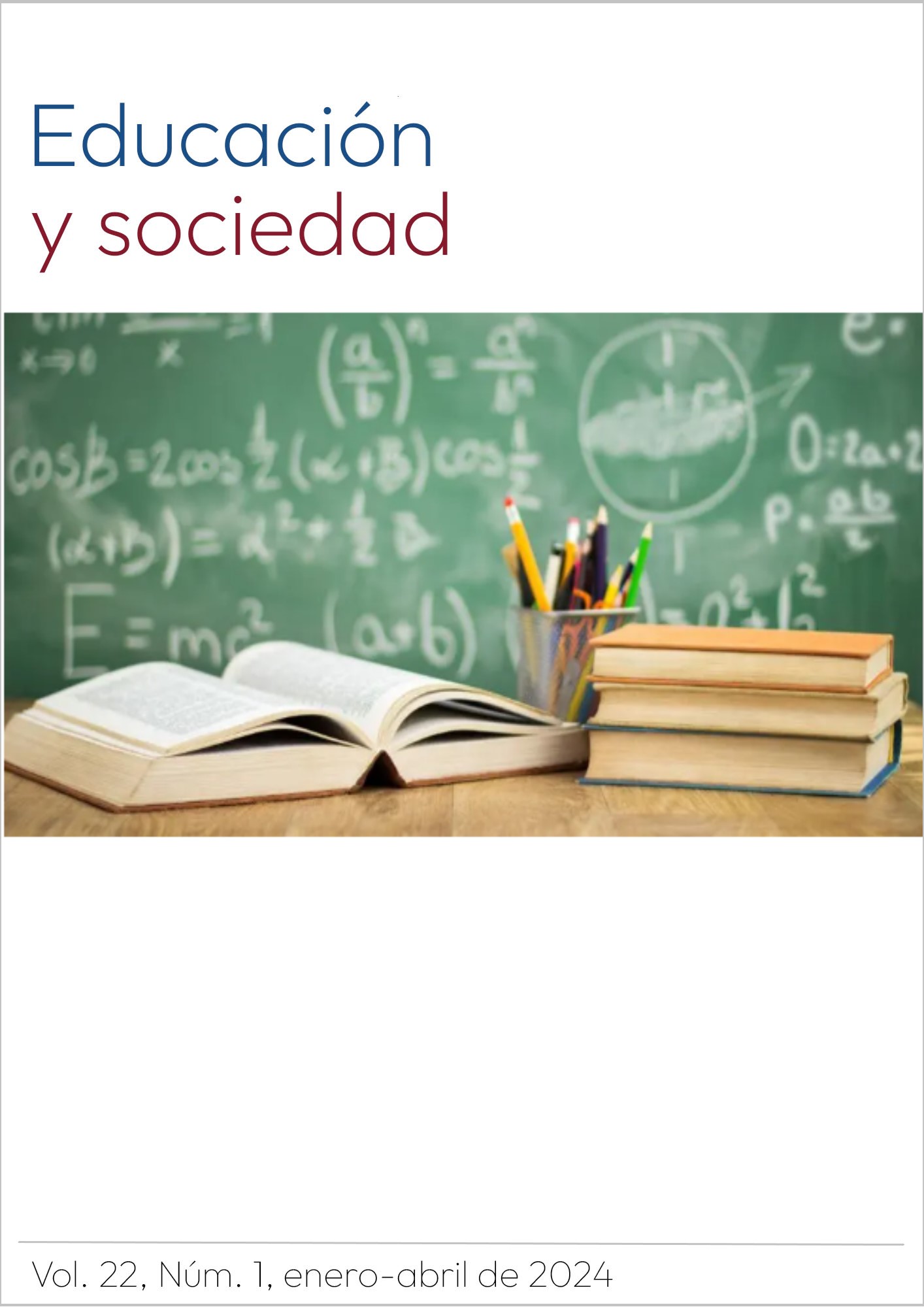Teaching English in Cuban Higher Education
DOI:
https://doi.org/10.5281/zenodo.10574404Palabras clave:
didactics of foreign languages, english, higher educationResumen
In Cuban Higher Education, English language teaching plays an important role in the comprehensive training of future professionals, helping them acquit in the different sectors of the society. The major – Bachelor of Education, Foreign Languages, English – qualifies English language professionals to carry out the teaching-learning process of the English language in the different educational contexts, and for that, the subject Didactics of Foreign Languages is imparted. In this article, the authors aim to explore the dialectical relationship between the triad – English, didactics and higher education. During the exploratory phase, methods and techniques of the empirical level were used, such as document analysis, observation and interview. Deepening on the didactic aspects that the professor must take into account in the teaching of the English language, a contradiction was spotted – the English language policy based on the Common European Framework of Reference for Languages is implemented in the training of professionals with a non-philologist profile while it is not in those with a philologist profile, i.e., English teachers-to-be.
Citas
Abreu, O., Gallegos, M.C., Jácome, J.G., & Martínez, R.J. (2017). La Didáctica: Epistemología y Definición en la Facultad de Ciencias Administrativas y Económicas de la Universidad Técnica del Norte del Ecuador. http://dx.doi.org/10.4067/S0718-50062017000300009
Beltrán, M. (2017). El aprendizaje del idioma inglés como lengua extranjera. Redipe. 6(4), 91-8. https://doi.org/10.36260/rbr.v6i4.227
Byrne, D. (1989). Teaching Oral English. Ediciones Revolucionarias.
Consejo, D. E. (2021). Marco común europeo de referencia para las lenguas: aprendizaje, enseñanza, evaluación. Volumen complementario. https://cvc.cervantes.es/ensenanza/biblioteca_ele/marco_complementario/mcer_volumen-complementario.pdf
Díaz, C., Martínez, P., Roa, I., & Sanhueza, M. (2010). La enseñanza y aprendizaje del inglés en el aula: una mirada a las cogniciones pedagógicas de un grupo de jóvenes estudiantes de pedagogía. Investigación y Postgrado, 25(2-3). http://ve.scielo.org/scielo.php?script=sci_arttext&pid=S1316-00872010000200002
Fontes, O. L., González, L., & Rodríguez, M. (2020). Aprendizaje del Idioma Inglés en la universidad cubana: una prioridad para la formación de profesionales competentes. Cognosis, 5(4). https://doi.org/10.33936/cognosis.v5i2.2295
García, I., Sierra, B., Quijano, R., & Pérez, M. (2020). La competencia comunicativa en estudiantes de los grados de Maestro: Una revisión sistemática. PUBLICACIONES, 50(3), 19-36. https://doi.org/10.30827/publicaciones.v50i3.15744
González, L. (2015). La enseñanza-aprendizaje del ldioma Inglés: métodos y estrategias. Santiago, 145-163. https://santiago.uo.edu.cu/index.php/stgo/article/download/730/702/2640
Harsch, C., Collada, I., Gutierrez, T., Castro Alvarez, P., & García, I. (2020). Interpretation of the CEFR Companion Volume for developing rating scales in Cuban higher education. https://doi.org/10.37546/JALTSIG.CEFR3-5
Hernández, R. C., & Cordero, D. (2021). El estímulo de la motivación intrínseca del estudiantado en un curso de inglés como lengua extranjera. Revista Internacional De Pedagogía E Innovación Educativa, 1(1), 149–172. https://doi.org/10.51660/ripie.v1i1.30
Jackson, F. (2020). La enseñanza del inglés, como idioma extranjero, desde una perspectiva sociolingüística en el aula. Dilemas Contemporáneos. https://doi.org/10.46377/dilemas.v36i1.2323
MES. (2016). Plan de Estudio de la Carrera Licenciatura en Educación, Lengua Extranjera Inglés. https://educa.uho.edu.cu/wp-content/uploads/2016/02/Plan-de-estudio-Educ-_Leng_Extranjeras.pdf
MES. (2017). Documento Base sobre el Perfeccionamiento de la Enseñanza del Inglés. https://educa.uho.edu.cu/wp-content/uploads/2018/03/00_CE_Doc-Base-Perefecc-Ingles.pdf
MES. (2022). Resolución No. 47. Reglamento del proceso docente y de dirección del trabajo para las carreras universitarias. https://siteal.iiep.unesco.org/sites/default/files/sit_accion_files/cuba_resolucion47-2022.pdf
Moscoso, M. D. L., Vega, M. V., & Martínez, M. (2019). La evolución del inglés como lengua franca, su enseñanza y aplicación en los negocios. UDA AKADEM, 1(3), 93–114. https://doi.org/10.33324/udaakadem.v1i3.204
Pérez, R., Sardiñas, J. L., y Mejías, J. L. (2023). La política de idioma inglés en la Universidad de Ciego de Ávila. Un reto actual. Educación y sociedad, 21(1), 70-87. https://revistas.unica.cu/index.php/edusoc/article/download/2328/4375?inline=1
Quintero, B., Bernal, P., & Veitia, M. (2021). La afectividad en el proceso de enseñanza-aprendizaje del idioma inglés en el contexto universitario. Revista Cubana de Educación Superior, 40(1). http://scielo.sld.cu/scielo.php?pid=S0257-43142021000100015&script=sci_arttext&tlng=pt
Rey, P. (2018). La Nueva Estrategia de Inglés: una novedosa perspectiva para la Educación Superior Cubana. Santiago (147). https://santiago.uo.edu.cu/index.php/stgo/article/view/4432
Smith, S. J. (2016). Cuban Voices: A Case Study of English Language Teacher Education. Comparative Perspectives, 15(4), 100-101. https://openjournals.library.sydney.edu.au/index.php/IEJ/article/download/10315/10814
Van, F. & Dávila, G. (2018). Attitudes towards English in Cuban Higher Education. Recent Developments and changes. Editorial Universitat Politècnica de València. 125-132. https://doi.org/10.4995/HEAD18.2018.7911
Wieckenberg, U. (2010). Elements of didactics in e-learning. https://pt.slideshare.net/
Publicado
Cómo citar
Número
Sección
Licencia
Derechos de autor 2024 Educación y sociedad

Esta obra está bajo una licencia internacional Creative Commons Atribución-NoComercial-CompartirIgual 4.0.
Los autores ceden su derecho de autor a Educación y Sociedad y otorgan a todos los usuarios potenciales, de manera irrevocable y por un período de tiempo ilimitado, el derecho de utilizar, copiar, transformar y distribuir el contenido. La cesión de derecho de autor incluye también:
- Traducir, adaptar, reutilizar, resumir el trabajo y ejercer todos sus derechos sobre dichas adaptaciones, resúmenes, extractos y obras derivadas.
- Incluir el trabajo y su versión traducida, adaptada o resumida, total o parcialmente, en bases de datos informatizadas, selección o recopilación de textos digitales o impresos a disposición de terceros.
Cada autor asume que en caso de que el artículo fuese aprobado para su publicación en la revista Educación y Sociedad:
- Cede sus derechos patrimoniales y autoriza al comité editorial para la publicación del documento con el correo electrónico y la afiliación institucional de los autores.
- Autoriza la divulgación en la página web de la revista, en repositorios y directorios en se incluye o pueda incluirse en el futuro.
- Certifica que ha contribuido directamente al contenido intelectual de este manuscrito.
- Se responsabiliza públicamente con su contenido y acepta que su nombre figure en la lista de autores.
- Garantiza que el artículo es un documento original y no ha sido publicado total ni parcialmente, en ningún otro lugar.
- No ha incurrido en fraude científico, plagio o vicios de autoría; en caso contrario se exime de toda responsabilidad a la revista Educación y Sociedad y se declara responsable.
- Se compromete a no presentar este artículo a otra revista para su publicación, hasta recibir la decisión de la editorial de la publicación sobre el concepto final.











